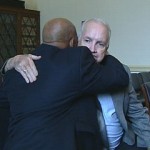Sat 7 Feb, 2009
Apology and forgiveness for racism
Comments (2) Filed under: RemediesTags: Apologies, Civil rights movement, Racism
 When I speak with audiences about the legacy of slavery in the U.S., one question that often comes up is how states can justify issuing apologies for slavery and racial discrimination when no one involved in those historic events is alive today.
When I speak with audiences about the legacy of slavery in the U.S., one question that often comes up is how states can justify issuing apologies for slavery and racial discrimination when no one involved in those historic events is alive today.
I often answer that an apology may make sense if an institution, such as a state or its legislature, wants to apologize in its own name, rather than that of the people, for its complicity in slavery or in the century of brutal and legal discrimination which followed.
Another response, however, is that many people involved in those horrific times are still alive today, and are capable of apologizing (and seeking forgiveness) in their own right.
On Tuesday, Elwin Wilson apologized on national television to congressman and civil rights legend John Lewis (D-Ga.) for attacking Lewis, then a freedom rider for Martin Luther King, in the whites-only waiting room of a South Carolina bus station during the civil rights movement.
Rep. Lewis forgave Wilson, and said on ABC’s Good Morning America:
I never thought this would happen. It says something about the power of love, of grace, the power of the people being able to say, ‘I’m sorry,’ and move on. And I deeply appreciate it. It’s very meaningful for me.
For you to come here today, it’s amazing to me. It’s unreal. It’s unbelievable. Maybe, just maybe, others will come forward because there needs to be this healing.
Wilson has been apologizing for many acts of racism in his youth, and had gone around his town apologizing to anyone whom he may have hurt, before learning that one of the men he attacked had become a member of the U.S. Congress.
Hat tip: Holly Fulton.
bobbo says:
Well, individual apologies are completely independent and different from State Apologies.
Obama being elected was the "time" that Wilson decided to apologies but doesn't explain at all why he felt the need to do so and BEFORE THAT what happened in his life/maturity to change his point of view. That would be interesting.
Declining amount of testosterone certainly doesn't hurt.
Billy jackson says:
I think thaat took a lot of guts to come on tv, and say that to all america to here. Now maybe more will take up that cross and do the same.